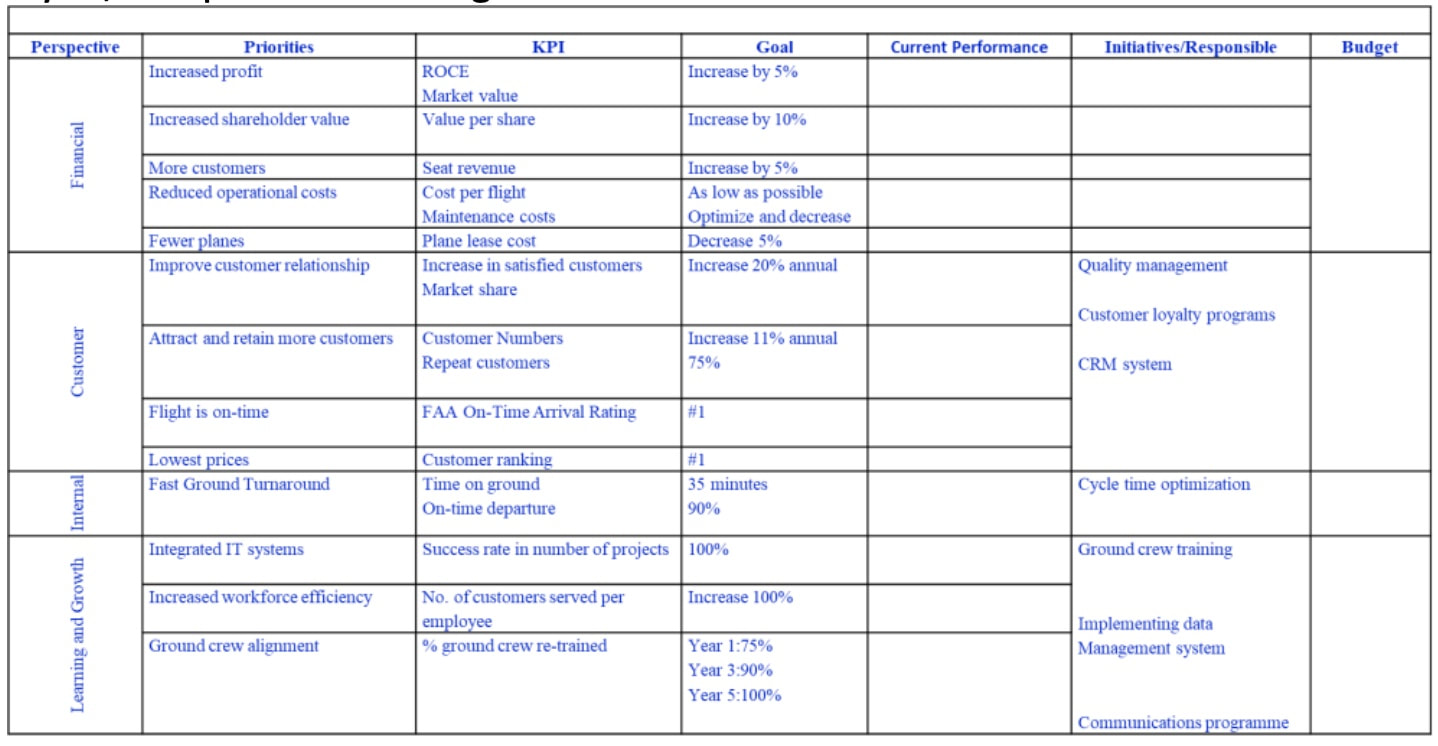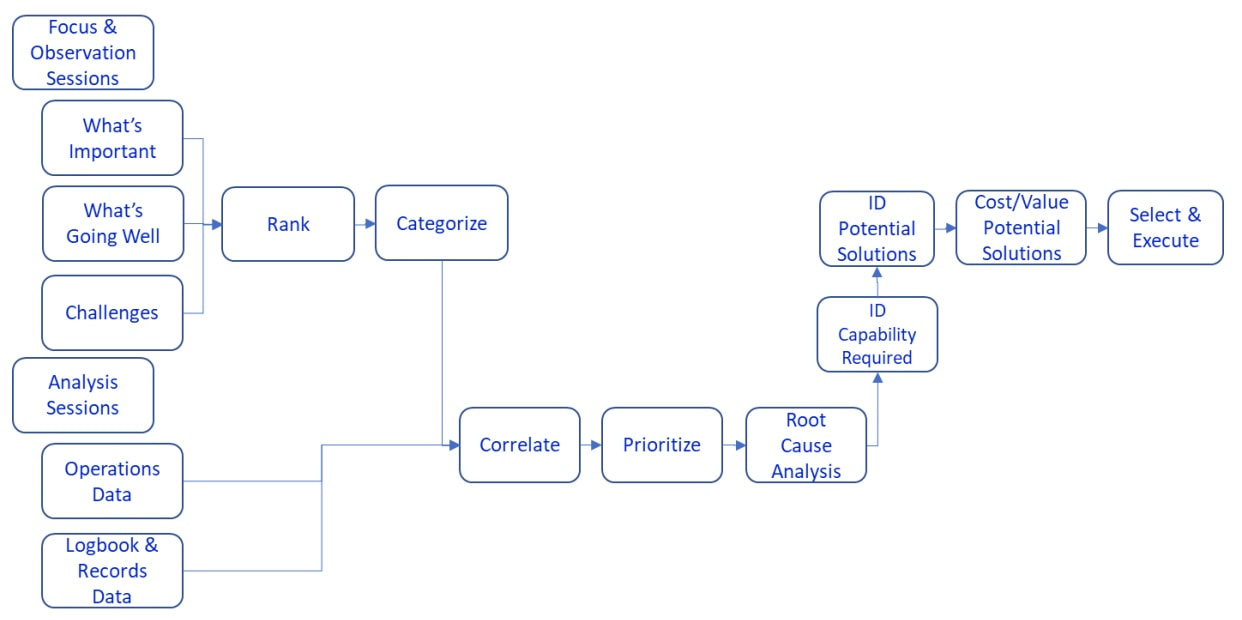|
Airline Operational Health is exactly what it sounds like, a performance awareness of the most important aspects of your operational goals. These goals are frequently reflected through the use of a balanced scorecard. Do you know what your company’s executives feel are the most important goals and expectations? What is Operational Health, and why do I need to know about it?Airline Operational Health is exactly what it sounds like, a performance awareness of the most important aspects of your operational goals. These goals are frequently reflected through the use of a balanced scorecard. Do you know what your company’s executives feel are the most important goals and expectations? More often than not, your company’s most important goals include customer satisfaction, employee satisfaction, on-time performance (flight departures), flight costs, maintenance costs, and profit. The use of a balanced scorecard can provide clear, targeted goals and KPIs, as well as expected levels of performance to them. Health Studies are an excellent way to: ➢ Document your overall operations or specifically targeted operational areas (e.g. Flight, Station, M&E, etc.) ➢ Baseline historic and current levels of performance in areas of importance ➢ Establish or update the Balanced Scorecard for specific operational and business goals (which may vary under Covid-limited operations) ➢ Identify challenge symptoms, correlate cross-departmental issues, understand and explore potential solutions ➢ Facilitate the creation of business cases in support of solution make/buy investment decisions An Operational Health Study may be known by many names within the industry. But, regardless of how it is known, the Study should be examining relevant operational areas to enable the production of meaningful information, not just “data”. One of the values of a Health Study is that when performed by knowledgeable external airline experienced facilitators, there can be a “fresh set of eyes” examining of any or all aspects of an operation. This means there is no “we’ve always done it this way” or “it’s mine” bias when making observations. It also keeps best industry practices from many other carriers under consideration during the focus sessions, observations, analysis, and problem-solving sessions. As illustrated in the example scorecard above, the use of focus and observation sessions is driven by the need for comprehensive reviews of flight, maintenance, and ground operations. These specific area reviews, together with detailed operational and financial information, can lead to a deeper understanding of current operations and the influences they can have on performance to defined goals. These detailed assessments can also bring to light the specific challenges and operational hot spots impacting progress toward performance goals. After identifying the challenges and top hot spots, quantifiable and qualifiable analytics can be applied to identifying root causes, provide suggested changes that may be required to resolve the challenges, enable detailed assessment, and present a selection of the highest value solutions. The results would be a robust understanding of the operation, a hierarchy of challenges, and selected solutions to support progress toward achieving improvement goals. What is the Value of an Operational Health Study, When Money is Tight and Our Performance is Okay?Gaining the knowledge and understanding of operational health now can provide a solid basis for both investment and improved levels of performance. Covid, along with many other significant current events, has had a profound impact around the world. These events have presented airlines with some extremely difficult times as they begin recovery and rebuild activities. Now, during these relatively slower and limited operations, is the ideal time to conduct a detailed Operational Health Study. A dedicated team of experienced Advisors can create a detailed comparison of pre-event operational performance against current reduced levels of operations. Upon completion of the study, a baseline of previous operations can be established and a clear set of improvement goals can be defined. If conducted during the recovery and rebuilding of operations, a Health Study can establish a stronger business position than before the shut-down event. As you recall or hire employees without baselining your operation and making changes first, you may end up training them initially on legacy processes and tools, and then incur additional costs for required retraining on new ones as you make investments in change. Implementing improvements now, during times of reduced operations and levels of system-wide complexity, difficulty and stress may enable a single training effort covering both continued and new ways of operating. This will increase the probability of success while reducing the costs of change. But Budgets are Tight, So How Can Changes be Justified?During a Health Study, pre-event operations and current operational baselines are established. Additionally, strategic goals are defined with the objective being improvement to future operations. A key element of these efforts is the utilization of both qualitative and quantitative analytics. These efforts will enable a clearer understanding of on-going costs associated with current operations activities and events. Applying these costs in a business case model provides the information needed to draw up a progressive and targeted plan for improvement. The plan can reflect how an initial effort, such as an Operational Health Study, would identify and initialize efforts to cut costs based on a desired Return on Investment (ROI). Another result is that the information will support more effective creation and management of Requests For Proposals (RFP) in support of competitive make/buy solutions to challenges. With the best value changes and solutions selected, well-timed implementation has a higher probability and level of success. And, at each step in the plan, the previous activity could fund the next. How Can a Study be Performed During Current Travel and Other limitations?Under normal circumstances, some aspects of an Operational Health Study will be accomplished via remote technologies. While other aspects of the study are best accomplished on-site, today’s technology can help span the gaps of non-availability of in-person and on-site activities. Reviews and analysis of manuals, training materials, and operational data typically fit in the remote category. Executive briefings, functional area focus sessions, additional data gathering and analytics fit in the latter category of on-site activities, but maybe partially accommodated through the use of Zoom or other video-conferencing technology. Operational observations are more difficult via remote, but on a limited basis, a video walk-through or recording of some activities can be accomplished. That said, this aspect of a Study will always deliver the best data, information, and results when performed in person. Can an Operational Health Study be Accomplished without Outside Help?Of course, it can! But, be cautious of being “blind” to things that may be “business as usual” and always accepted as the norm. If qualified team members with the facilitation, observation, and analytical skills to do a Health Study internally are not available, then teaming with Advisors who have experience providing these types of support to dozens of carriers can be the most effective path to the benefits of a Study. Keep in mind that no matter who does the study, it cannot be done in a vacuum. It is a collaborative effort with airline Subject Matter Experts teaming with expert Advisors. What are Some of the activities that Should be Included in an Operational Health Study?➢ Perform data and document reviews ➢ Baseline pre-Covid and current state operational performance ➢ Hold facilitated focus sessions ➢ Perform operational observations ➢ Perform quantified and qualified Analyses ➢ Document, document, document What are Some of the Outputs I Should Expect from an Operational Health Study?➢ A current operational model ➢ Challenge documentation ➢ Analytics documentation ➢ Recommendations for prioritized changes ➢ A customized or updated Balanced Scorecard to measure change ➢ Data for business cases for make/buy solution decisions ➢ Data and information for use in creating RFPs and vendor selection What are Some of the Results I Should expect from an Operational Health Study?In summary, it’s critical to remember that when contemplating change; whether to improve, grow or even reduce operations, the most certain way to ensure failure is to not understand where you are coming from, where you are now, and where you wish to go to!
Conversely, the best way to improve the probability of success is to know and document everything previously outlined in this paper. We all know that we need an origin, a flight plan, and a destination to have a safe and successful flight. A facilitated, collaborative Operational Health Study supports documentation of current operations and future planned operations, as well as a potential path to get there. Thank you for reading about how Operational Health Study knowledge can support operational improvement needs. Please view a discussion about Operational Health. To have a detailed discussion about how an Operational Health Study could help with the unique challenges in your operation, request a no-cost advisory session with Envision Aviation Advisors. Or, let's discuss on LinkedIn about how Envision may be able to help improve the health of your operations. Comments are closed.
|
envision aviation advisorsSharing insights from our more than 100 years of combined experience in the aviation industry across 6 continents Archives
October 2021
Categories |
envision aviation advisorsSeattle, WA, USA
|
Shortcuts |
|
|
Copyright © 2024 · Envision Aviation Advisors, Seattle, Washington USA
|
Site built and marketed by Blockbeta Marketing
|



 RSS Feed
RSS Feed







